Recent News
Catch up on the latest BioSci news, features and videos by subscribing to the School of Biological Sciences Newsletter.
-
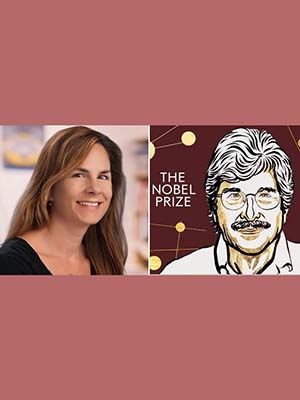
BioSci Scientists Contribute to 2024 Nobel Prize-Winning Research
Amy Pasquinelli and Terrence Sejnowski played foundational roles in globally recognized achievements
Behind the accolades of the 2024 Nobel Prizes in Physiology/Medicine and Physics were School of Biological Sciences’ Amy Pasquinelli and Terrence Sejnowski, researchers who played foundational roles in the globally recognized scientific achievements.
-

Innovative Bioelectronic Device Offers New Hope in the Fight Against Bacterial Infections
Researchers have developed a bioelectronic device that taps into the natural electrical activity of certain bacteria found on our skin, paving the way for a drug-free approach to managing infections. The advancement reduces the harmful effects of a bacterium known for antibiotic resistance.
-
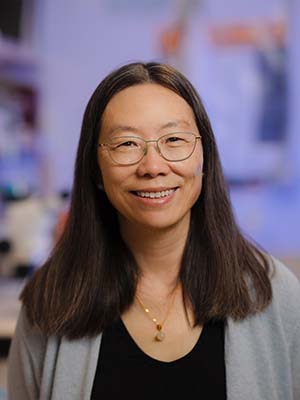
Neurobiologist Yishi Jin Elected to the National Academy of Medicine
School of Biological Sciences professor is recognized for contributions to understanding mechanisms that underlie formation and function of the nervous system
Biological Sciences Professor Yishi Jin, who investigates the roots of the nervous system, has been elected to the National Academy of Medicine, one of the highest honors in health and medicine.
-

As Temperatures Rise, Researchers Identify Mechanisms Behind Plant Response to Warming
With implications for agriculture and food production, biologists map two paths that plants implement during elevated heat conditions
Plants widen microscopic pores on their leaves in response to heat. But scientists lacked an understanding of the mechanisms behind this “sweating” function. Now, biologists have unlocked the details behind these processes and identified two paths that plants use to handle rising temperatures.
-
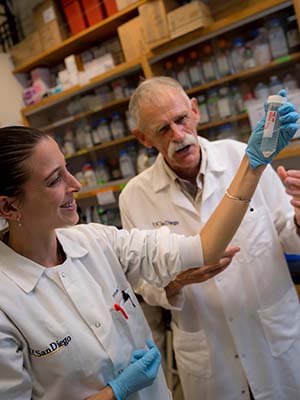
Cognitive Deficits from Meth and PCP Use Are Generated By a Common Neurotransmitter Switch
Neurobiologists reversed drug-induced impairments in memory by switching neurotransmitters back to their normal chemical states
The effects of sustained drug abuse can manifest in many ways. Loss of memory and reduced cognitive functions are some of the effects that can persist for years. Scientists in Neurobiology have now identified a mechanism in the brain that generates drug-induced cognitive impairments.
-
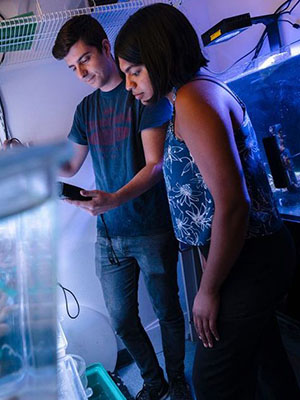
UC San Diego Receives $10 Million for Center on Neurobiology in Changing Environments
Center will focus on the impacts of climate change on marine species’ nervous systems
The Paul G. Allen Frontiers Group has selected UC San Diego to receive a four-year, $10 million grant to establish the Allen Discovery Center for Neurobiology in Changing Environments, which includes BioSci's Matthew Lovett-Barron and Diana Rennison. -

$21 Million from NIH to Study Sensory Input and Resulting Movement
A grant from the NIH’s BRAIN Initiative will help researchers understand the brain’s complex underlying neurocircuitry
Professor David Kleinfeld of the Departments of Neurobiology and Physics is leading a new $21 million grant from the National Institutes of Health that will allow him and a team of researchers to study the coordination of multiple sensory inputs and head movements. -

Chancellor’s Interdisciplinary Team Catalyst Fund Announces Five Inaugural Awardees
UC San Diego announced recipients of its inaugural Chancellor’s Interdisciplinary Team Catalyst Fund, including a project co-led by BioSci Professor James Nieh. -
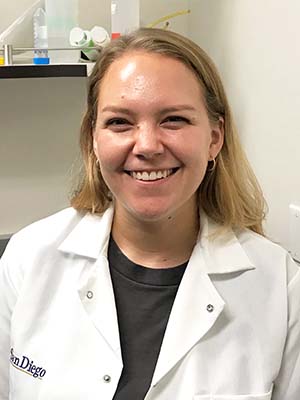
Katie Martin Named 2024 Helen Hay Whitney Fellow
The Helen Hay Whitney Foundation has selected UC San Diego School of Biological Sciences Postdoctoral Scholar Katie Martin as a recipient of a biomedical fellowship. -

UC San Diego Opens the Goeddel Family Technology Sandbox
UC San Diego opens the Goeddel Family Technology Sandbox, an unrivaled cluster of state-of-the-art instruments for cutting-edge research and training
UC San Diego and its partners officially opened the Goeddel Family Technology Sandbox, a hub that brings together cutting-edge instruments for science and education. The facility is one of the world’s most pioneering centers for technology across the biological, physical and health sciences.
To read more about the School of Biological Sciences happenings, see the News Archives.
